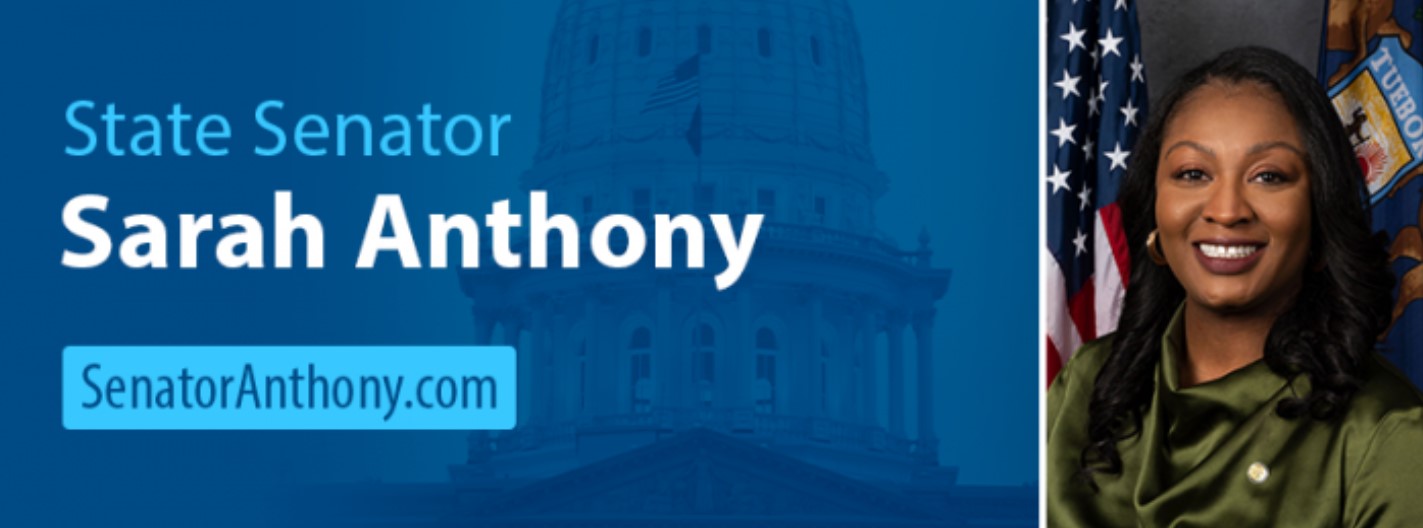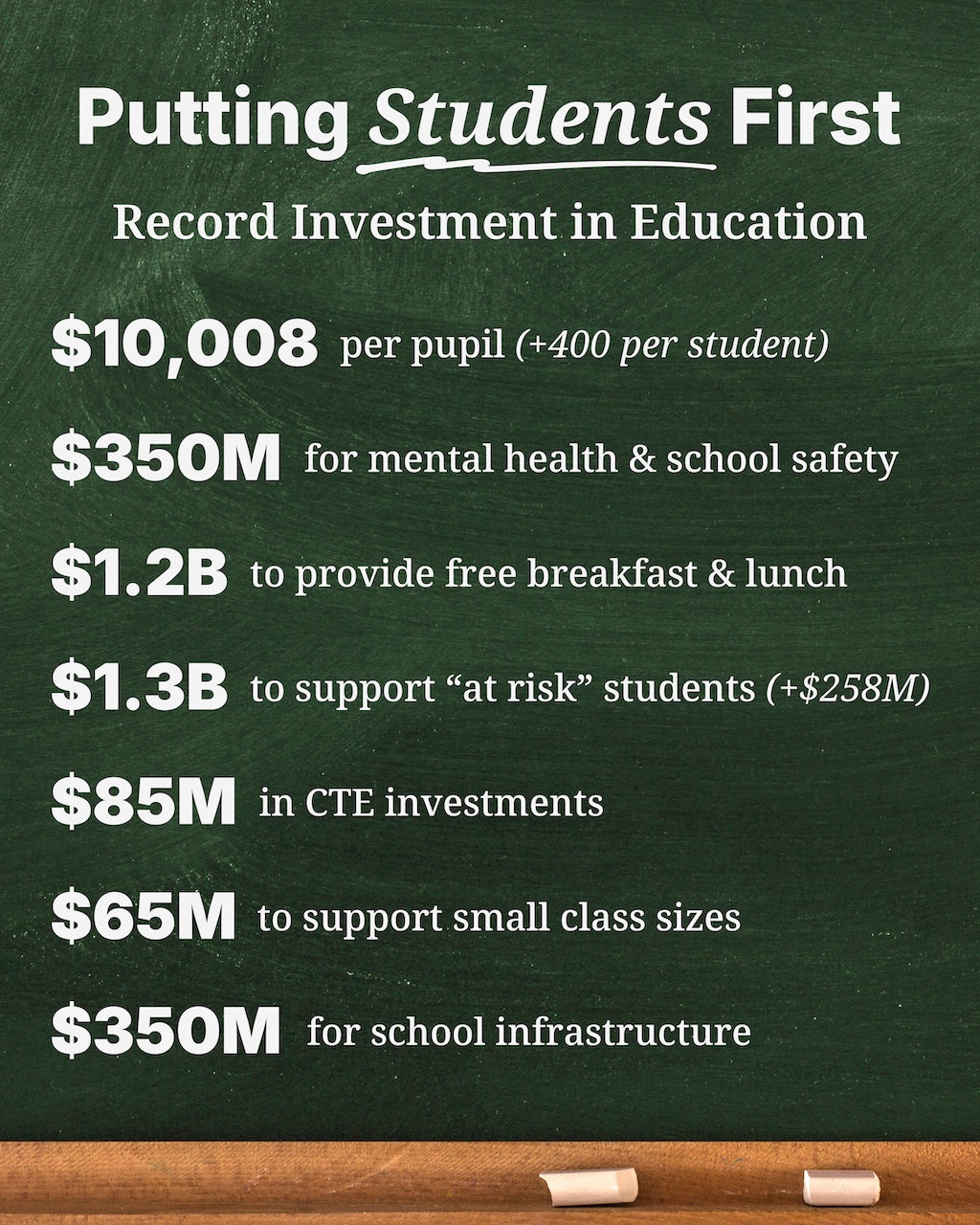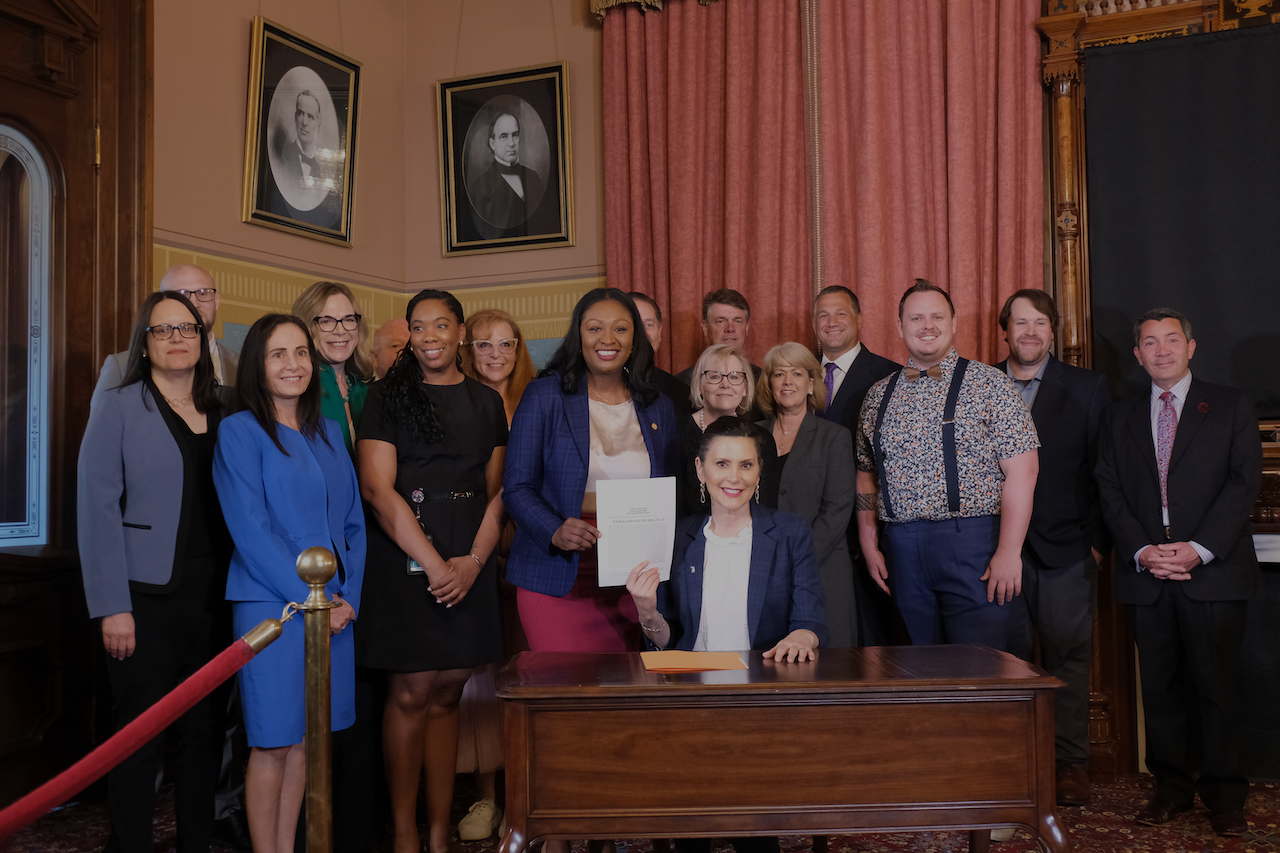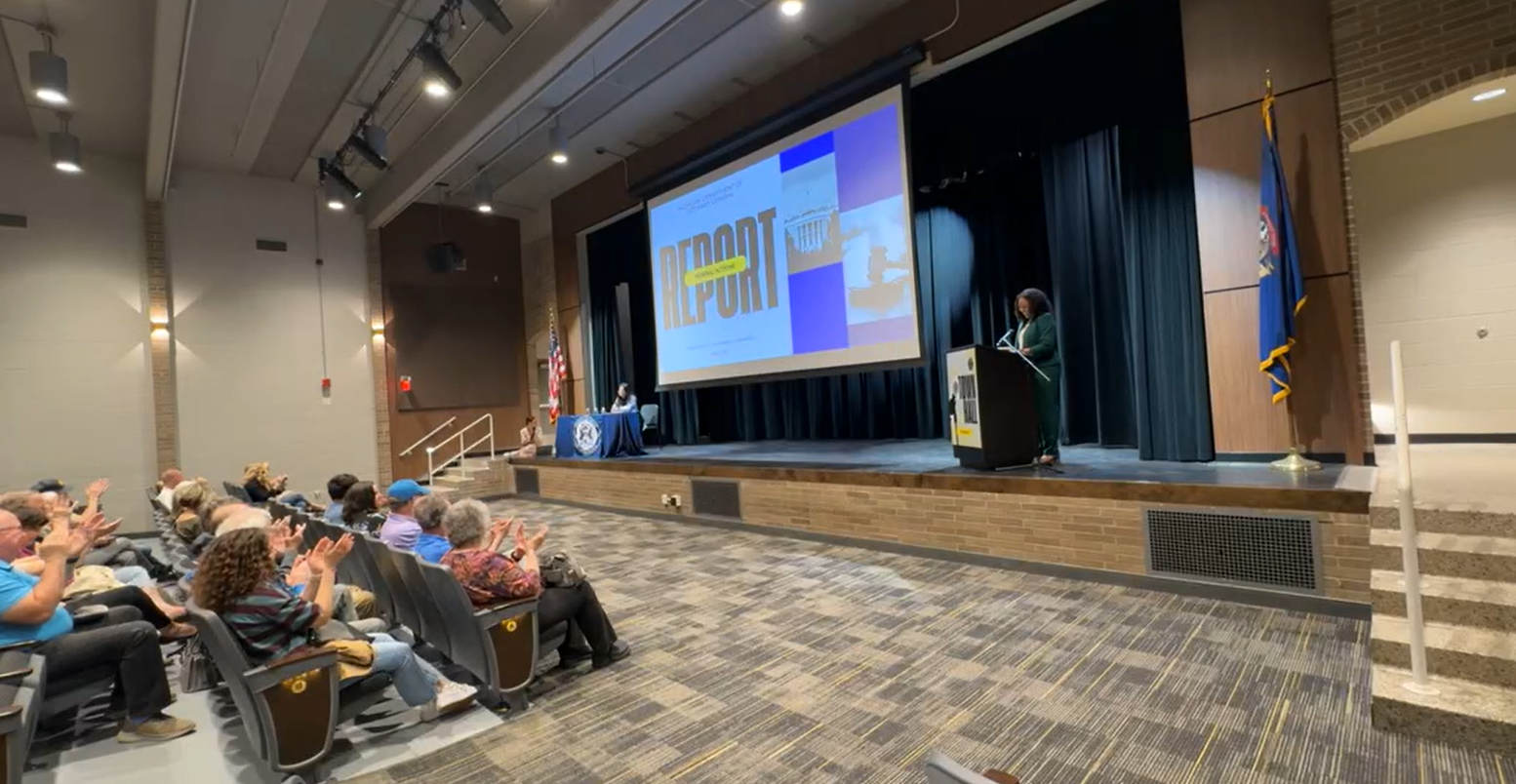
Dear Neighbor,
It’s hard to believe we’re already approaching the halfway point of 2025. As Senate Appropriations Chair — the Senate’s lead budget negotiator — I’ve been hard at work shaping our state’s budget priorities. In this edition of my e-newsletter, along with the usual legislative updates and community event highlights, we’ll take a deeper look at the budget process and the progress we’ve made so far.
If you or someone you know would like to provide any feedback about what’s happening in Lansing, or if you need assistance of any sort, please connect with my office. You can contact me by sending an email to SenSAnthony@senate.michigan.gov or by calling (517) 373-6960.
In Service,

SARAH ANTHONY
State Senator
District 21

- As Chairwoman of the Senate Appropriations Committee, I remain committed to keeping you informed as we finalize the Senate’s budget recommendations. Read on to learn more!
- Next week, I will join Rep. Kara Hope as a special guest at a Senior Scam Town Hall on Friday, May 16, from 9:00 – 10:30 a.m. at the Sam Corey Senior Center. Additional details below.
- Keep Up to Date — Our newsletters are full of updates on what Team Anthony has been working on both in the Capitol and throughout our community. For more frequent updates, I also encourage you to follow our team on Facebook, Twitter, and Instagram.

Crafting a State Budget with Sen. Anthony
Every year, crafting Michigan’s state budget is a team effort involving both the Legislature and the governor. Together, we negotiate and develop a new budget that directs funding to residents, schools, communities, local governments, businesses, and more.
The budget process unfolds in six key steps:
- Governor’s Recommendations: In January, budget experts meet to estimate how much the state can spend. Based on this, the governor presents her budget recommendations to the joint House and Senate Appropriations Committee.
- Legislative Drafting: The House and Senate use the governor’s proposal as a starting point to develop their own budget versions.
- Subcommittee Review: Subcommittees in both chambers focus on specific areas — such as health care, education, and transportation — and draft detailed budgets for each.
- Chamber Approval & Negotiation: Each chamber votes on its version of the budget. Then, members from both chambers work together to resolve any differences.
- Governor’s Signature: A final version of the budget is sent to the governor, who must sign it into law by July 1, 2025.
- Implementation: The new budget takes effect on October 1, 2025, marking the beginning of the 2026 fiscal year.
As Chair of the Senate Appropriations Committee, I play a key role in guiding the budget process in the Senate. From the list above, we are currently at steps 3 and 4: the subcommittees have started to present their budget proposals to the full Senate Appropriations Committee. These proposals will then be brought to the Senate floor for a vote by the entire Senate.
Next, the House and Senate will exchange budget proposals. If there are any differences, a joint group of senators and representatives — called a conference committee — will work out a final compromise before it goes to the governor to be signed into law.
Although the fiscal year doesn’t begin until October 1, Michigan law requires the Legislature to pass the final budget by July 1. This allows schools to prepare for their fiscal year, which also begins on the first of July. That’s why we’ve already passed the Senate’s education budget proposal out of the Appropriations Committee and sent it to the Senate floor for a vote — you can read more about it below. You can also read a more in-depth explanation of our state’s budget process here.
Michigan Senate Advances Bold New Education Budget Proposal Focused on Putting Students and Teachers First
The Senate committee that oversees the PreK-12 education budget has passed a record education budget proposal that prioritizes Michigan students, invests in safe and healthy learning environments, and strengthens public schools.
With federal funding for education facing unprecedented uncertainty, Senate Democrats stepped up to deliver a bold, future-focused plan for the Fiscal Year 2026 budget. In addition to raising per-pupil funding to $10,008, the proposal includes $2.5 billion in investments for student mental health, critical upgrades to school infrastructure — including clean and functional HVAC systems — and a continued commitment to free breakfast and lunch for every Michigan public school student.

The budget proposal is part of Senate Democrats’ ongoing commitment to ensuring every child, regardless of zip code, has access to a safe school, a strong support system, and the opportunities they need to thrive.
The Appropriations Subcommittee voted to report the proposal to the full Senate for further consideration.
What’s Next for the Budget?
As Chairwoman of the Senate Appropriations Committee, I remain committed to keeping you informed as we finalize the Senate’s budget recommendations — prioritizing affordable housing, lowering costs for families, and building stronger, healthier communities.
In my next e-newsletter later this month, I’ll provide a detailed breakdown of the final Senate budget proposal and what it means for our state and everyone who calls Michigan home. You can also follow my Facebook page for future updates.
Honoring Mental Health Awareness Month with Action

Sen. Sarah Anthony stands with advocates and the governor following the signing of Sen. Anthony’s Senate Bill 27, Michigan’s first mental health parity law.
May is Mental Health Awareness Month, a time to raise awareness, reduce stigma, and promote understanding and compassion for folks struggling with their mental health. My Senate colleagues and I have worked hard to help address the mental health crisis here in Michigan by:
- Expanding access to mental health care coverage – Last Spring, my bill, Senate Bill 27, was signed into law, requiring insurance companies to cover treatments for mental health and substance use disorders at the same level as physical health services.
- Preventing suicide through commonsense gun safety legislation – Firearms account for over half of all suicide deaths, and 90% of suicide attempts with firearms are successful. That’s why my colleagues and I passed an 11-bill gun violence prevention package in 2023, including a “red flag” law that helps temporarily remove firearms from the homes of people who pose an immediate threat to themselves or others. In the first year since this law took effect, 30% of the Extreme Risk Protection Orders (ERPOs) filed mentioned threats of self-harm or suicide.
- Investing in mental health care and suicide prevention – The state budget is an impactful tool us lawmakers use to uplift and support the mental health needs of our communities. In the 2025 budget, we secured:
- $48.2 million to support substance use disorder treatment and prevention efforts;
- $30 million to increase access to 24-hour crisis services, outpatient behavioral health care, and psychiatric rehabilitation;
- $9.4 million to provide statewide coverage for 988, the suicide and mental health crisis line;
- $1.2 million to support suicide prevention programs for veterans and their families;
- $750,000 to provide resources for community-based suicide prevention efforts to meet the needs of veterans, service members, and their families; and
- $250,000 to support Six Feet Over’s suicide loss survivor program, a nonprofit that provides mental health education and support to individuals with lived experiences of suicide.

Senior Scam Town Hall with Rep. Kara Hope

Next week, I will join Rep. Kara Hope as a special guest at a Senior Scam Town Hall alongside Ingham County Sheriff Scott Wriggelsworth. Together with members from the Attorney General’s team, we will discuss common warning signs of scams that occur via phone, mail, email, and text. We will also provide tips to help seniors protect themselves from these scams.
WHEN: Friday, May 16, from 9:00 – 10:30 a.m.
WHERE: Sam Corey Senior Center, 2108 Cedar St., Holt, MI 48842
Find more information here. I hope to see you there!

Federal Actions Town Hall with Attorney General Dana Nessel Event Recap

Sen. Sarah Anthony (Podium) and Attorney General Dana Nessel (Table) at a Federal Actions Town Hall
Thank you to everyone who joined Attorney General Dana Nessel and me for our recent town hall discussion! We had a productive conversation about navigating the changing landscape and uncertainty at the federal level. We also explored the constitutional checks that protect our rights, shared updates on recent legal actions, and discussed how these efforts directly impact our communities. If you weren’t able to make it, click here to view the live footage from the event.
Events like these provide a wonderful opportunity to engage in open and honest conversation and gain valuable insights into what we are doing at the Capitol to improve life for every Michigander. I hope to see you at my next event!
